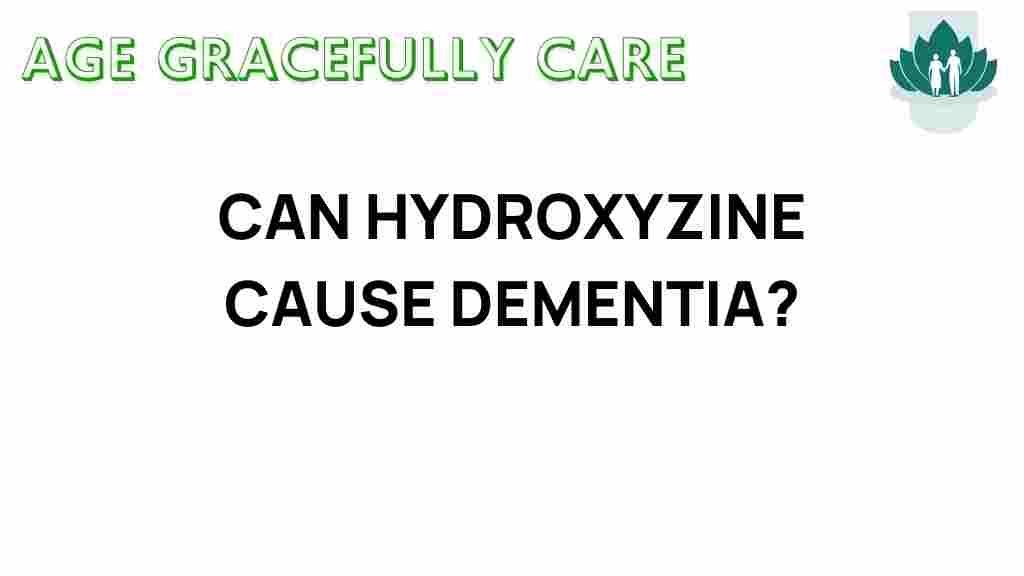Can Hydroxyzine Trigger Dementia? Unraveling the Truth Behind the Risks
Hydroxyzine is a medication commonly prescribed for its anxiolytic (anti-anxiety) and sedative properties. While it can effectively alleviate symptoms of anxiety and improve mental health, concerns have arisen regarding its potential side effects, particularly in the elderly. Recently, some studies have suggested a possible link between hydroxyzine and dementia. In this article, we will delve into the relationship between hydroxyzine, dementia, and medication safety, focusing on elderly care and the overall impact on mental health.
Understanding Hydroxyzine
Hydroxyzine is an antihistamine that is primarily used to treat anxiety, nausea, and insomnia. It works by blocking the action of histamine in the body, which can help to reduce feelings of anxiety and promote relaxation. Hydroxyzine is often prescribed for short-term use and can be effective for managing acute anxiety episodes.
The Role of Medication in Mental Health
Medications play a crucial role in managing mental health conditions. For individuals suffering from anxiety or other psychiatric disorders, medications like hydroxyzine can provide significant relief. However, with any medication, there are potential side effects that must be considered, especially in vulnerable populations such as the elderly.
The Dementia Connection
Dementia is a broad term that encompasses various cognitive impairments, including memory loss, difficulty in reasoning, and changes in behavior. It is primarily associated with aging, and the risk factors for developing dementia are continually being studied. There is growing concern that certain medications, particularly those affecting the central nervous system, may increase the risk of dementia.
Research on Hydroxyzine and Dementia
Recent research has focused on the potential link between hydroxyzine and dementia. Some studies suggest that long-term use of certain antihistamines could be associated with an increased risk of cognitive decline. However, the evidence is not conclusive, and more research is needed to establish a clear connection.
- Study Findings: Some observational studies have indicated that prolonged use of sedating antihistamines may be linked to an increased risk of dementia.
- Mechanism of Action: Hydroxyzine’s sedative effects may contribute to cognitive impairment over time, particularly in older adults.
- Clinical Recommendations: Medical professionals may recommend alternative treatments for anxiety in elderly patients to mitigate potential risks.
Potential Side Effects of Hydroxyzine
Like any medication, hydroxyzine has side effects that users should be aware of. Understanding these side effects can help individuals and caregivers make informed decisions regarding medication safety.
- Common side effects include:
- Drowsiness
- Dry mouth
- Dizziness
- Fatigue
- Serious side effects may include:
- Severe allergic reactions
- Changes in mood or behavior
- Confusion or disorientation
Medication Safety in Elderly Care
Elderly individuals are often prescribed multiple medications, increasing the risk of drug interactions and side effects. Medication safety is paramount, and healthcare providers must carefully consider the risks and benefits of prescribing hydroxyzine to older patients.
Steps for Ensuring Medication Safety
Here are steps caregivers and healthcare providers can take to ensure medication safety for the elderly:
- Review Medications Regularly: Regularly assess all medications being taken to identify potential interactions.
- Monitor for Side Effects: Keep a close eye on any side effects that may arise after starting hydroxyzine or any new medication.
- Consult Healthcare Providers: Always discuss any concerns about medications with healthcare providers, especially regarding long-term use.
- Consider Non-Pharmacological Interventions: Explore alternative treatments for anxiety, such as therapy, exercise, or relaxation techniques.
Understanding the Risks and Benefits
When considering hydroxyzine for anxiety management, it’s vital to weigh both the potential benefits and risks. While hydroxyzine can provide quick relief for anxiety symptoms, its long-term effects on cognitive health must be considered, particularly in the elderly.
- Benefits:
- Effective short-term relief for anxiety.
- Non-habit forming compared to some other anti-anxiety medications.
- Risks:
- Possible cognitive decline with long-term use.
- Side effects that may impact daily functioning.
What to Discuss with Your Doctor
If you or a loved one is considering hydroxyzine, it’s important to have an open dialogue with your healthcare provider. Here are some key points to discuss:
- Your complete medical history, including any current medications.
- Any concerns regarding memory or cognitive function.
- Alternative treatments for anxiety and their potential risks and benefits.
Conclusion: Making Informed Decisions
Hydroxyzine can be an effective medication for managing anxiety, but concerns about its potential link to dementia, particularly in elderly patients, warrant careful consideration. As research continues to unfold, it is crucial for patients, caregivers, and healthcare providers to stay informed about the risks and benefits of this medication.
Ultimately, making informed decisions about using hydroxyzine involves a thorough understanding of the medication, its side effects, and potential impacts on mental health. Always consult with a healthcare professional for personalized advice and to explore all available treatment options.
For more information on medication safety and mental health, you can visit Mental Health America for resources and support.
Additionally, if you want to learn more about the effects of medications on cognitive health, check out Alzheimer’s Association’s research.
This article is in the category Health and created by AgeGracefullyCare Team
